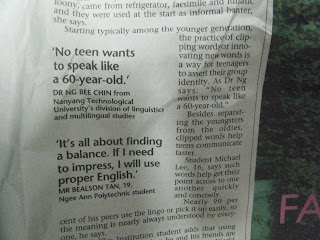


Enthu. Unglam. Emo. Noob.
Do all these words sound familiar to you? If not said on a regular basis, most of you have most likely said these words at least once or twice to your peers before. And all these words, also known in the field of linguistics as ‘clipping’, are apparently creating a headache for parents of youths as they are finding it increasingly harder to communicate and understand their children. They also disapprove of the usage of such language as they feel that it is a form of slang and so, ‘improper’ English, but to the youths, this language is what sets them apart from the adult population.
So is the use of such lingos really that worrisome? It seems to be a divided opinion.
Adults like the interviewee, Serene Foo, seemed to feel so when she commented ‘It is just nonsense. It just doesn’t sound like English to me’, as do Mr Goh Eck Kheng, chairman of the Speak Good English Movement when he cautioned how slang is not acceptable in formal settings. However, the youths seemed to find no cause of worry at all, and I find myself agreeing with them. As quoted from Bealson Tan of Ngee Ann Polytechnic, ‘It is all about finding a balance.’
As much as parents still think that their children are still ignorant because of their age, I feel that because of the studying environment and general upbringing Singaporean youths these days grew up in, they have become smart enough to differentiate for themselves whether it is appropriate or inappropriate to use lingos for the different situations. Slangs might come out naturally from their mouths when they are in a casual gathering with friends but it is unlikely you will see them carry it over to more important and serious occasions like project presentations or during examinations.
Just as much as Singlish is a Singaporean lingo, this new form of word clipping is just a lingo formed by youths to feel different from the adults and in a way, to communicate quicker and more efficiently with each other. Moreover, looking on the bright side, although these words are shortened forms of proper English words, at least it is still words derived from real words. That still makes it in a way, a level higher then the regular Singaporean lingo doesn’t it?
(Credits: The Sunday Times, Lifestyle 31/05/09)
I see nothing wrong in the Singaporean lingo. As a matter of fact, I am more incline to use it more often as it is convenient. I can get my idea across people easily. It is never a big issue as long as the user knows when, where and how to convey it properly. Normally, parents or adults who encounter problems understanding and adapting to this are the ones who get unhappy and fustrated over this small matter. I wouldnt say this is a higher level language but rather a new way of life. Welcom 2 e new era!
ReplyDeleteI agreed with pikapika that there's actually nothing wrong with singapore lingo. It could actually allows them to convey their message easier and to avoid any communication barriers since it is known to everyone. Not all know how to use bombastic phrases/words.
ReplyDeleteIn striking a conversation, one would like to feel comfortable in speaking in a common language so that the conversation would last instead of finding ways to end it because the conversation sounds like writing some proper newspaper articles. =)
it's our native tongue. we should be proud of it. honestly, i find myself unable to express certain feelings and emotions in proper english and only singaporean lingo can be used to explain what i feel. i guess it's because i've spent my whole life immersed in a society that utilizes it very often.
ReplyDeleteyou guys a point about your lingo. its what makes you guys you. who know maybe in a hundred years it'll be your official language? or would you let it be?
ReplyDelete